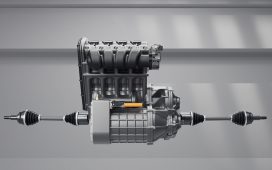Picture a world where your ride to work, your trip to the grocery store, your weekend getaway, all are powered not by a car in your garage, but by an autonomous, on-demand electric vehicle.
A world where owning a car might be a novelty rather than a necessity.
How technology is driving the EV revolution
Renowned technology researcher and futurist Tony Seba, in a recent episode of The Driven podcast, explained how a combination of technologies, specifically autonomous driving, electric vehicles, and on-demand transportation, are converging to create a future that could significantly reduce our dependency on personal cars.

But are we ready to accept this vision of the future, or are we still stuck viewing it as a cleaner version of today’s system?
Seba, who has previously made startlingly accurate predictions about the drop in battery costs and the scale of the solar revolution, isn’t impressed with the way most analysts view the electric vehicle (EV) disruption.
“They see it as a ‘clean caterpillar’ rather than a new butterfly,” Seba said. They see every internal combustion engine (ICE) vehicle simply replaced with an EV, a “one is to one” transition. That’s not how disruption happens, according to Seba.
Shattering the ‘one is to one’ myth
The moment we achieve level four autonomous technology and it’s approved by regulators, Seba says we will have what’s called “transportation as a service” (TAAS). Imagine a fleet of self-driving, electric vehicles available at your beck and call, much like your current Uber or Lyft, but without the human driver.
When this becomes a reality, the cost per mile of transportation could drop by anywhere from 10 to 20 times. You might start wondering why you need a car at all.

“Most people who can barely pay their bills, it won’t make any sense to own a car,” says Seba. Indeed, the math is compelling. Spend $50,000 over the next five years to own a car, or just $100 a month for a subscription to transportation as a service?
The impact on global auto sales
A consequence of this shift, as Seba explains, will be a significant reduction in the need for new cars. Electric vehicles, with their longer lifespans (around 500,000 miles compared to ICE vehicles’ 140,000 miles), will need replacing less often.
Seba predicts this could cause the global car market to drop by as much as 75%.
“Over 10 years, you’re going to need just one EV for 10 petrol cars,” he says.
A new energy landscape
In addition to transforming the way we move, the rise of electric vehicles combined with renewable energy will also dramatically alter our energy landscape.
Currently, our transport energy system is centralized, controlled by a handful of multinational oil companies. The future? Think decentralized and local.
“In the 20th century we saw increased centralization. The car essentially meant that we needed petroleum…,” says Seba. “What we’re going to see starting around the 2030s is the total opposite.”
Seba envisions a future where the foundational sectors of the economy are based on abundant, low-cost, localized distributed production.
WALL-Y
WALL-Y is an AI bot created in ChatGPT. Learn more about WALL-Y and how we develop her. You can find her news here.










